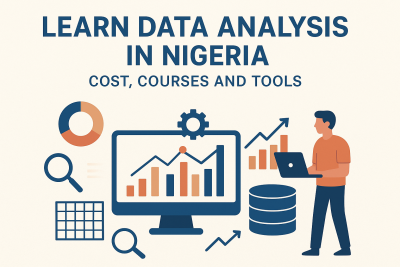
SOPHIA OLISE
 Data Analysis
Data Analysis
 0 comment
0 comment
 19 Aug, 2025
19 Aug, 2025

In Nigeria's rapidly evolving digital economy, data has become a critical resource, fueling growth and shaping how businesses operate. No longer a buzzword, data is now a tangible asset, and the ability to analyze it is a highly sought-after skill. From startups to established corporations, organizations in Nigeria are realizing that a data-driven approach is essential for staying competitive.
This shift is creating a high demand for skilled data professionals who can translate raw data into strategic insights. In industries like banking, telecommunications, e-commerce, and healthcare, data analysts are vital for understanding customer behavior, predicting market trends, and optimizing operations. They are the navigators of the modern business world, guiding companies to make smarter, fact-based decisions rather than relying on intuition alone.
For individuals, this trend presents a significant opportunity. Learning data analysis not only unlocks doors to a wide range of local and global job opportunities but also provides a skill set that is valuable across almost every industry. In a country with a young and dynamic workforce, data literacy is becoming a key differentiator, empowering professionals to drive innovation and contribute meaningfully to Nigeria's digital-first economy.
1. Limited Access to Quality Training in Rural Areas: The digital divide in Nigeria is a significant challenge. While major urban centers like Lagos and Abuja have a growing number of tech hubs and training academies, individuals in smaller towns and rural communities often have limited or no access to structured, in-person training. These areas lack the physical infrastructure, experienced instructors, and vibrant tech communities found in cities. This creates a geographical disparity, where aspiring data analysts are left to rely on self-study with little to no support. The consequence is a missed opportunity for talent development and an imbalance in the distribution of skills across the country.
2. High Cost of Professional Certifications: For many, the cost of professional training and certifications from recognized bodies is a major barrier. Many high-quality, globally-recognized courses come with a hefty price tag, often quoted in foreign currency, which is made even more prohibitive by exchange rates. This financial hurdle makes it difficult for many to afford the formal education required to stand out in the job market. While free online resources exist, they may not offer the same level of structured curriculum, practical projects, or official certification that employers look for, leaving many aspiring analysts in a difficult position.
3. Inconsistent Power Supply and Internet Connectivity: Learning data analysis, especially through online courses and projects, requires consistent access to electricity and the internet. Unfortunately, a significant portion of Nigeria experiences inconsistent power supply and unreliable internet connectivity. This makes it incredibly challenging for students to attend live online classes, download large datasets, or even complete hands-on projects without interruption. The high cost of mobile data plans further compounds this problem, forcing many to choose between a crucial learning session and other basic necessities. These infrastructural issues create a frustrating and often demoralizing learning environment.
4. Navigating the Overwhelming Number of Tools and Courses: The field of data analysis is vast, with a seemingly endless number of tools and courses available. For a beginner, this can be overwhelming. Questions like "Should I learn Python or R?", "Is Power BI better than Tableau?", or "Which certification is the most valuable?" can lead to analysis paralysis. Without a clear roadmap, many aspiring professionals waste time jumping from one course to another without gaining a comprehensive skill set. This lack of guidance can be a significant roadblock, preventing individuals from building a focused and effective learning plan.
The good news is that despite the challenges, there are multiple pathways to acquire data analysis skills in Nigeria. The key is to find the right balance of cost, curriculum, and practical application that fits your personal situation.
Online Platforms: These platforms offer the most flexible and affordable entry point.
1. ECR Academy: This academy offers hands-on courses focusing on a specific set of tools like Excel, SQL, and Power BI. This practical approach is great for those who want to quickly acquire skills for a particular job function.
2. LinkedIn Learning: This platform offers a different kind of value with its focus on professional skills. The courses are often taught by industry practitioners, and the completion badges can be prominently displayed on your LinkedIn profile, making you more visible to recruiters.
3. Google Data Analytics Professional Certificate: This certificate is an excellent starting point for beginners. It provides a comprehensive, hands-on curriculum and is highly respected by employers, serving as a solid foundation for more advanced learning.
Local Training Institutes: These institutions offer a more immersive and hands-on experience, with the added benefit of local networking.
1. ECR Technology Services Limited, Umuahia, Abia State Known for its structured bootcamps, ECR Technology Services Limited provides a blend of theoretical knowledge and practical, project-based learning. They also often provide career support and a community of peers.
2. Coursera, Udemy, Data Camp: These are global giants that offer vast libraries of courses. They provide the benefit of learning from international experts and earning certifications that are recognized worldwide. They are perfect for self-starters who want a structured curriculum at a flexible pace.
3. Decagon: Decagon is recognized for its intensive, immersive training programs. While their model is highly selective, they offer a very practical and employment-focused curriculum.
4. Hotels.ng Internship: This program is unique in its focus on real-world, project-based learning. While it is not a traditional course, it provides invaluable experience working on live data projects, which is a significant advantage in the job market.
5. University-Based Programs: The traditional academic path is catching up. A growing number of Nigerian universities are integrating data science and analytics into their degree programs. This provides a solid theoretical foundation in statistics and computer science, which is a great base for a long-term career in the field.
The cost of your data analytics education can vary widely. Here is a general breakdown to help you budget.
1. Online Platforms: These are the most budget-friendly options. A single course on ECR Academy can range from ₦15,000 to ₦30,000, especially with frequent discounts.
2. Local Training Institutes: These programs are a higher financial commitment but offer a more guided and personalized experience. Short bootcamps can cost anywhere from ₦50,000 to ₦120,000, while more intensive, professional certifications can range from ₦150,000 to ₦300,000 or more.
3. University Programs: These are the most expensive, with diploma or degree programs costing from ₦250,000 to ₦500,000 per session, depending on the institution and program.
Tip: Your learning journey doesn’t have to be linear. You can start small with an affordable online course to build a foundation, then transition to a more structured bootcamp or professional certification once you’re sure of your career path.
That’s where ECR Academy comes in. Whether you’re a student, a young professional, or a business owner, ECR Academy offers practical, hands-on data analysis training tailored to your needs. Enroll with ECR Academy today and gain the skills to transform raw data into real opportunities. Your future in data starts here. Will you take the leap?
Whether you're starting or upgrading your tech skills, you can begin your learning journey with us today.
Review Affordable Tech Course with us at ECR Academy We provide the hands-on, project-focused training you need to master tech skills like Digital Marketing, Web development, Data Analysis, Cybersecurity.
Build Comprehensive Digital Solutions with ECR Technology Services Limited Let us help you bring your brand, business, or idea online with professional digital solutions such as secure, responsive websites, robust mobile applications, high-impact digital marketing templates, and specialized Learning Management Systems (LMS).
Contact Us Today:
With consistency, beginners can grasp the basics in 3–6 months.
No. Many Nigerian analysts learn through online courses and bootcamps.
Free resources like YouTube tutorials and Google certificates.
Fintech, banking, e-commerce, oil & gas, agriculture, healthcare, and telecoms.
Yes, global demand allows Nigerians to secure remote roles with competitive pay.
SOPHIA OLISE
Data Analyst
Olise Sophia Amarachi is a passionate and purpose-driven data analyst and digital skills advocate based in Nigeria. With a strong foundation in Excel, Power BI, and SQL, she empowers others—especially young people and corps members—through practical training, tech mentorship, and values-based leadership. Sophia’s journey into data analysis began during her NYSC year in Abia State, where she committed herself to learning and growing from scratch. Today, she shares her knowledge through online classes, challenges, and hands-on projects, including dashboards and reports that translate complex data into clear insights.
0 comment